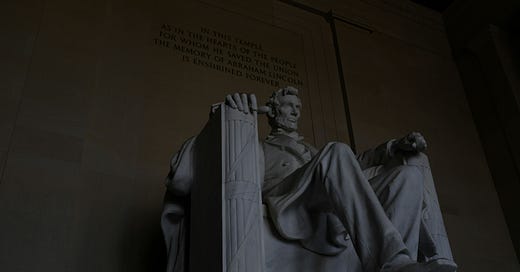Lincoln
To do what he did, to be who he was, maybe he had to be broken hearted. Neighbors pulled him into their homes, afraid he would end his life if left to his own devices. Instead, he simply broke wide enough for a nation, wide enough to hold the tension, feel division like the tugging of his own fractured heart, like wholeness is just holding the wreckage tenderly with open palms. Now I am trying to hold this: the darkness stitched in me, the brightness woven in you. We are one cloth, pulled at the edges, a single fabric, breaking.
Photo by Girma Nigusse on Unsplash
The Prompt
Today’s poem was inspired by a passage from Parker Palmer’s “Healing the Heart of Democracy,” a gorgeous and timely book that I’m slowly savoring. (Thank you
for the wonderful recommendation!) Parker Palmer is a brilliant and big-hearted author and activist, who has suffered several debilitating bouts of depression in his life. During a period of recovery, he read the book “Lincoln’s Melancholy” by Joshua Shenk (which I’ve now added to my impossibly long list of Books I Want to Read). The following passage reflects the understanding Palmer gleaned from his reading:Lincoln’s need to preserve his life by embracing and integrating his own darkness and light made him uniquely qualified to help America preserve the Union. Because he knew dark and light intimately—knew them as inseparable elements of everything human—he refused to split North and South into “good guys” and “bad guys,” a split that might have taken us closer to the national version of suicide.
Instead, in his second inaugural address, delivered on March 4, 1865, a month before the end of the Civil War, Lincoln appealed for “malice toward none” and “charity for all,” animated by what one writer calls an “awe-inspiring sense of love for all” who bore the brunt of the battle. In his appeal to a deeply divided America, Lincoln points to an essential fact of our life together: if we are to survive and thrive, we must hold its divisions and contradictions with compassion.
Reading this, I wished I could sit down for a cup of coffee with Abe (Mr. Palmer would be welcome to join us, too, of course.) I’d want to ask him what impact his experiences of broken-heartedness have had on his open-heartedness—how the pain and isolation of depression might, in the long run, have led him to a deeper sense of connection. I’d want to know what he’s learned about how to help others open their hearts, about how to glimpse your own blind spots, about when and how to soften your rigidity, and when to hold the line. If his thinking hasn’t updated since 1865, then odds are I would bump up against his cultural and historical blind spots, but I like to imagine that our souls keep growing after death, keep breaking open until we are indistinguishable from the whole (or Love or the Universe or God or Nature or whatever word you prefer).
If you’d like a prompt to play around with today, then I invite you to imagine this: You have the power to pull one historical figure back into this world, teleporting them to a location of your choice. . . . John Lewis in the oval office. John Prine, strumming your guitar. Maya Angelou, writing here on Substack. Julia Child, cooking your Thanksgiving meal. Fred Rogers in your neighborhood.
Who would you choose? Where would you send them? Be a child for a moment (if that sounds fun). Daydream. Be as silly as you’d like. Be as serious as you’d like. Imagine the play-by-play of how things might go. Jot down the images. Tell the story. Hold nothing back. Maybe the stream of words is a poem. Or maybe after vomiting every thought you have across every inch of margin and page, you find something gleaming there—an image, a line, an insight that forms the basis for something crisper. I would be delighted and honored to read what you come up with.
Oh, and if you’d like a little Parker Palmer in your life but aren’t up for reading a full book, this podcast episode is wonderful.
I look forward to reading your words!






In some ways, raising Jesus
was probably easy.
I doubt he talked back
or loafed excessively
or pretended he hated her
or stole her weed.
.
But imagine the weight of
the Savior
in your belly, in your arms,
in your heart.
Yours would be an eggshell world:
don’t coddle, don’t snap,
don’t helicopter, don’t spank,
don’t scream, don’t sulk,
don’t roll over and kill him.
.
Jesus was the Son of God
and could do as he pleased.
But Mary was a regular person
asked to work the miracle
of not messing up her child,
not even a little bit,
as a favor to the billions
she could not imagine.
Did he love with longing
Trying to consume his darkness
With a light of compassion
A light for most
That brightens one’s space
But often seems devoid
Of any warming heat